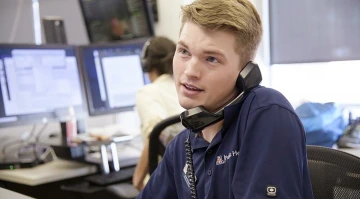Answering the Call to Serve
The Arizona Poison and Drug Information Center was able to lighten the load for the Arizona Department of Health Services and each of its county counterparts by answering the flood of phone calls from residents concerned about COVID-19.
“We are very glad that faculty and students from the University of Arizona can play such a critical role in assisting others during a global health emergency,” says University of Arizona President Robert C. Robbins. “Our Poison and Drug Information Center is taking calls and triaging potential cases.”

Briggs Carhart, a master’s degree student in public health, helps the Arizona Poison and Drug Information Center field the hundreds of daily calls it receives from people worried about the COVID-19 pandemic. / University Communications photo
Experts and students from the College of Pharmacy and the Mel and Enid Zuckerman College of Public Health were on call 24 hours a day at 1-800-222-1222 for free and confidential conversations.
Kristen Pogreba-Brown, an assistant professor in the department of epidemiology and biostatistics, trains students to work in a campus call center assisting health departments with disease outbreaks for a course called Student Aid for Field Epidemiology Response.
Under normal circumstances, students in the course conduct detailed surveys to figure out how Arizonans with food poisoning were exposed to pathogens such as salmonella. But amid the COVID-19 pandemic, students provided “surge capacity” for overwhelmed county health departments that, in addition to their regular work, were inundated with calls from the public about COVID-19.
“Having public health students answer those questions is a good fit,” Pogreba-Brown says. “We had everything in place to take those calls, especially from 5 p.m. to 8 p.m., when the health department should go home, because they have really long days.”
Pogreba-Brown has enlisted current and former students to assist the Arizona Poison and Drug Information Center. After she sent out an email asking students to volunteer for shifts, a dozen slots were filled in just a few hours.
Briggs Carhart, a master of public health student concentrating on epidemiology, was one of the first to respond to Pogreba-Brown’s request for volunteers. The next day, he was trained on the phone system and taking calls.
“There are pharmacists on the phone with people asking questions about COVID-19 while they’re waiting for calls about rattlesnake bites or infants accidentally swallowing medication,” Carhart says. “My duty is to take my training and use it in a real-life scenario.”
Carhart says students were given a script to provide guidance in answering common questions, but he didn’t limit himself to reading from it verbatim.
“You’re talking to people who are worried, so sounding like a robot isn’t the best approach,” Carhart says. “I was getting on their level, calming them down, allowing them to vent their concerns. I was able to give them some reassurance and some answers. That way, we’re providing a service, rather than making them worry more.”
